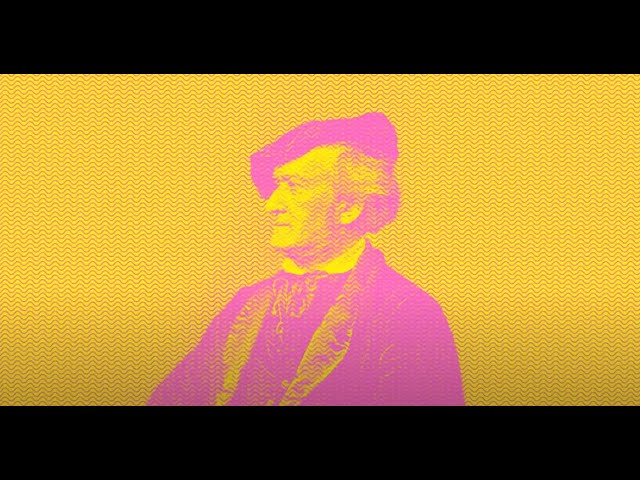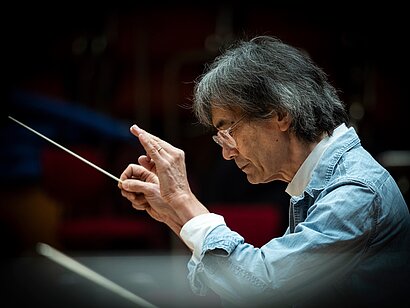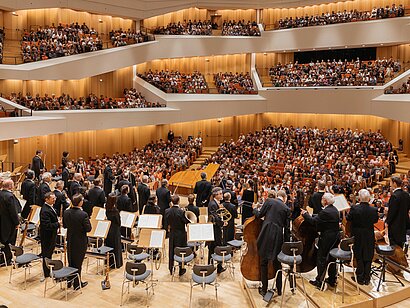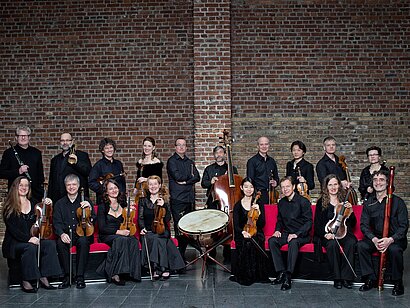Richard Wagner's »Ring« historically informed
It is an operatic tale which has raised as much wild enthusiasm as it has polarized opinion, which has been probed academically and widely discussed, and which clearly, humanity is not done with: When Richard Wagner opened the first Bayreuth Festival in 1876 with his »Ring«, this event went down in music history and the composer destroyed genre boundaries with a bang.
In 2026, as the 150th anniversary of the world premiere is celebrated, the »Ring« is set to make history once again: under the artistic leadership of Kent Nagano and Jan Vogler, it will be re-examined, rehearsed and performed over several years, from 2023 to 2026 – in the artistic context of the time when it was first produced, on the basis of the most recent research on Wagner and historical performance practice, flanked by a comprehensive framework program and in association with a new Wagner Academy in Dresden.
Academic research meets theatrical practice
The project’s focus is a direct combination of scientific work with musical practice, exploring how Wagner imagined his »Ring« and what it might have sounded like. Academics work directly with the conductor Kent Nagano, the orchestra members and the singers. In doing so research and practice inspire each other in an unique way.
The undertaking entails a detailed reconstruction of historical instruments and their playing techniques as well as the rediscovery of a vocal style of singing and speaking which differs significantly from today’s techniques of interpretation: in Wagner’s day, vocalists not only used far less vibrato, but also employed numerous dramatic devices ranging all the way to speaking.
The interpretation is also based on each creative protagonist’s intense intellectual and practical exploration of performance techniques of the Wagner era, through a multitude of workshops. Another central issue is illuminating Wagner’s socio-political attitudes and examining his antisemitism, which also influenced his thoughts on performance practice.
The individual works of Wagner’s tetralogy will be performed in concert every year from 2023 to 2026 at renowned concert halls in Germany and abroad. One particular focus in 2024 will be on performance venues in Central Europe with a long-standing Wagner tradition, for example Prague. Thus, the theatre then known as the Neues Deutsches Theater in Prague was inaugurated in 1888 with Wagner’s »Die Meistersinger von Nürnberg«; its first director was Angelo Neumann, who had championed the popularization of Wagner’s »Ring« in Europe like few others.
The Academis
The scientific work is accompanied by researchers of various disciplines, including experts in linguistics, musicology and cultural studies.
- Dr. Dominik Frank (Universität Bayreuth)
- Prof. Bernhard Hentrich (Hochschule für Musik Carl Maria von Weber Dresden)
- Prof. Dr. Dr. h. c. Ursula Hirschfeld (Martin-Luther-Universität Halle-Wittenberg)
- Prof. Dr. Thomas Seedorf (Hochschule für Musik Karlsruhe)
- Prof. Dr. Michael Steinberg (Brown University, Providence, Rhode Island)
- Prof. Dr. Friederike Wißmann (Hochschule für Musik und Theater Rostock)
ACADEMIC CURATOR: PD Dr. Kai Hinrich Müller (Hochschule für Musik und Tanz Köln)
In addition, he is committed as Artistic Director of the »Ring« project »The Wagner Cycles« , and as patron of the Herrenchiemsee Festival. He is Honorary Conductor of the Philharmonic State Orchestra, the Orchestre symphonique de Montréal, Concerto Köln and the Deutsches Symphonie-Orchester Berlin and works regularly with the world’s leading international orchestras as a guest conductor. His numerous recordings stand testament to his artistic versatility.
DRESDNER FESTSPIELORCHESTER
A masterful combination of passionate, joyful music-making and knowledgeable interpretations – that is the Dresdner Festspielorchester, founded in 2012 by the Dresdner Musikfestspiele, which brings together members of leading European Early-Music ensembles in a unique way.
Apart from its chief conductor Ivor Bolton, artists such as Constantinos Carydis, David Robertson and Daniele Gatti have conducted the orchestra. It works regularly with such renowned soloists as Giuliano Carmignola, Isabelle Faust, Bejun Mehta, Waltraud Meier, Valer Sabadus, Nicola Benedetti, Thomas Zehetmair, Simone Kermes, René Pape and Martin Helmchen. In addition to its acclaimed performances during the Dresdner Musikfestspiele, guest appearances have taken the orchestra to Berlin’s Philharmonie, the Elbphilharmonie Hamburg, the Philharmonie Essen and the Bogotá Music Festival, among others.
With one foot firmly rooted in Cologne’s musical life and as a regular guest at important musical venues worldwide, Concerto Köln stands for excellence in the interpretation of historical music up to Romanticism. For many years, the musicians have been proving through their choice of projects that artistic sophistication and popular success are not mutually exclusive. Openmindedness in questions of repertoire has been characteristic of Concerto Köln since its founding days. Classical works by Gluck, Mozart and others have been an essential part of their programs since the self-administered orchestra was launched.





